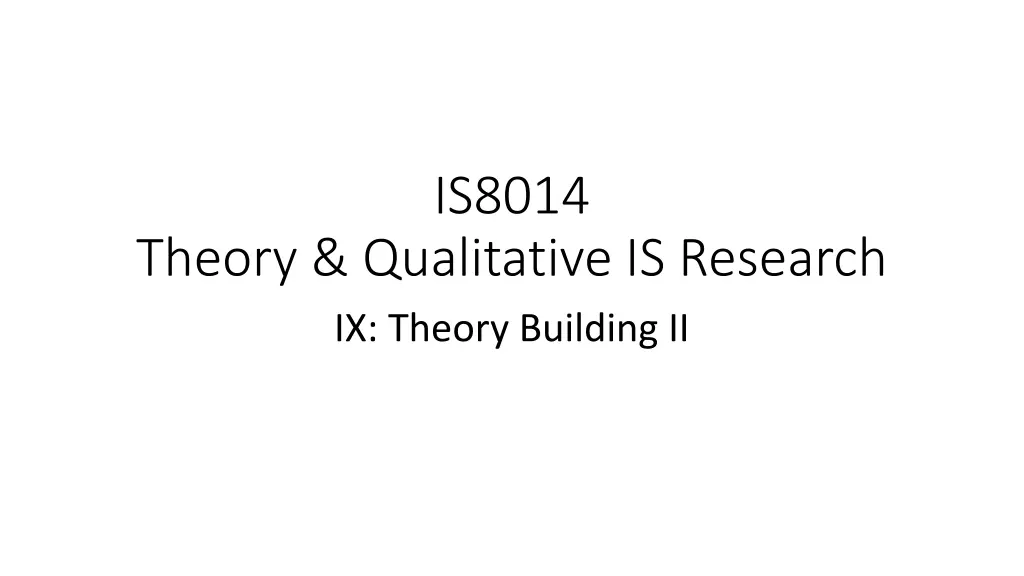
Understanding Theory Building in Information Systems Research
Engage in the student-led class focusing on theory building in IS research, comparing papers by Martinsons et al. and Leidner & Tona. Explore the role of storytelling in theory development. Propose a theory domain that addresses inadequacies in existing IS theories.
Download Presentation

Please find below an Image/Link to download the presentation.
The content on the website is provided AS IS for your information and personal use only. It may not be sold, licensed, or shared on other websites without obtaining consent from the author. If you encounter any issues during the download, it is possible that the publisher has removed the file from their server.
You are allowed to download the files provided on this website for personal or commercial use, subject to the condition that they are used lawfully. All files are the property of their respective owners.
The content on the website is provided AS IS for your information and personal use only. It may not be sold, licensed, or shared on other websites without obtaining consent from the author.
E N D
Presentation Transcript
IS8014 Theory & Qualitative IS Research IX: Theory Building II
Student Presentation 3 In today s class, we need to engage with the process of theory building what does it actually involve. This is a student led class, so I expect that the students will demonstrate the practical issues of theory building Some questions that may help: How does Martinsons et al. s paper (in particular Figure 1) help researchers with the process of theory building? Also, how does it differ from Leidner and Tona s (2021) paper that we looked at two weeks ago? What is the role of storytelling in the building of theory?
Student Activities Propose a topic domain or phenomenon where you argue that there is a need for theory development. Note, it must relate to an IS phenomenon and you must demonstrate that existing theory is in some way inadequate, thus manifesting the need for either a modification to an existing theory or the development of a completely new theory. This will be your coursework for the theory proposal. Provide as much detail as you can about the theory that you plan to develop.
Readings for Next Week Davison, R.M. and Diaz Andrade, A. (2018) Promoting Indigenous Theory, Information Systems Journal 28, 5, 759-764. Davison, R.M. and Martinsons, M.G. (2016) Context is King! Considering Particularism in Research Design and Reporting, Journal of Information Technology 31, 3, 241-249. Davison, R.M., Ou, C.X.J. and Ng, E. (2020) Inadequate Information Systems and Organizational Citizenship Behavior, Information & Management 57, 6, 103240, 1-10. Ou, C.X.J., Pavlou, P.A. and Davison, R.M. (2014) Swift Guanxi in Online Marketplaces: The Role of Computer-Mediated-Communication Technologies, MIS Quarterly 38, 1, 209-230. Tsui, A.S. (2006) Contextualisation in Chinese Management Research, Management and Organizational Review 2, 1, 1-13. Xiao, X., Tan, B., Leong, C. and Tan, F.T.C. (2021) Powered by Qinghuai : The melding of traditional values and digital entrepreneurship in contemporary China, Information Systems Journal 31, 6, 769- 802. Zheng, W. and Davison, R.M. (2022) Hybrid social media use and guanxi types: How do employees use social media in the Chinese workplace? Information & Management 59, 103643, 1-15.
Guiding Questions for Next Week Theories can be positioned at different levels micro, mid range, grand, meta. Each makes a different kind of contribution. See Leidner and Tona (2021). Some concerns have been raised about how much context should be evidenced in a theory more context tends to lead to more of a micro theory. Is that a problem? See also Davison and Martinsons (2016). Are there value differences between the different levels of theory (some are more valuable than others) or are they just different (but potentially of equal or similar value)? Which stakeholders are likely to appreciate more contextually-specific theory? Why? Historically, most theories have been written by authors in the USA. Is that a problem? What are the limitations of such culturally-narrow theorising? Several scholars (e.g. Tsui, 2006; Davison and Martinsons, 2016) suggest that there is a need for more indigenous theorizing, i.e. theorizing that draws on locally specific cultural or contextual phenomena. In the Chinese context, this can include such concepts as guanxi, renqing, etc. What advantages may accrue if we draw on a wider range of particular cultural phenomena in our theorising?
